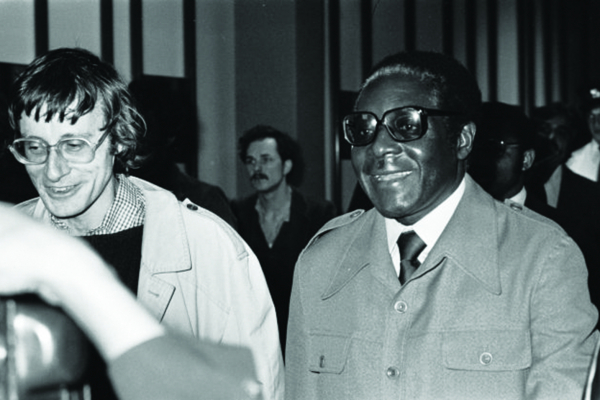
With this year’s independence commemorations having been held against the backdrop of begging on one hand, and an en masse dismissal of government nurses who had gone on strike on the other, it was well and truly not yet Uhuru.
By Cyprian Ndawana
Ever since ousted President Robert Mugabe buckled to demands for gratuities and pensions by protesting war veterans in 1997, it emerged that the Promised Land was still far. He literally bribed them by dishing out ZW$50 000 to each of the over 50 000 veterans of the country’s liberation struggle.
He gave in after they had marched to State House. It stunned him that their protests were intense, including interrupting his Heroes’ Day speech. With his back against the wall, Mugabe dismissed advice from then Finance minister Herbert Murerwa, that the payments would bankrupt the economy.
Amid speculation that foreign reserves had resultantly dwindled to record lows, the Zimbabwe dollar plunged, so did the stock market. As if by design, there too was a national blackout, and Friday, November 14, 1997 became known as Black Friday.
Investors quit Zimbabwe in a huff, with fast-food chain, McDonald’s putting off plans to open their first outlet. Food prices spiralled, leading to riots. In a desperate bid to quell the protests, Mugabe deployed the army on to the streets, ironically, against the public drawing outrage.
Since then, fruits of independence have been conspicuous by their scarcity. This year’s commemorations, the first one without Mugabe at the helm, were no exception; they were held against the backdrop of penury, with the citizenry crowded in streets, vending.
With the Mugabe tenure abruptly ending without him delivering the Promised Land, his departure was a huge relief to the impoverished citizens. It was welcomed with song and dance across political and ethnic divides.
- Chamisa under fire over US$120K donation
- Mavhunga puts DeMbare into Chibuku quarterfinals
- Pension funds bet on Cabora Bassa oilfields
- Councils defy govt fire tender directive
Keep Reading
It had long been apparent to all and sundry that Mugabe had neither the cows nor the bees to produce the milk and honey that was his liberation era clarion call. He in fact was a boon, utterly devoid of ideas to resuscitate the economy.
His stewardship led to the closure of businesses and extinction of the Zimbabwe currency. With inflation and unemployment rates on record high, an unprecedented citizenry exodus emerged as multitudes voted with their feet against indigence.
Mugabe rolled out a series of economic recovery programmes, but all came to naught.
Introduction of multiple currencies was inevitably an economic hair brained idea. As the country sank deeper into the mire, Mugabe announced in his August 2015 State of the Nation Address, yet another feeble recovery program, the said 10-Point Plan for economic growth.
Ancient wisdom is infallible, yet rarely does humanity heed. True to presage, the rule of law and economic viability are inseparable cousins; you cannot choose to keep one, and lose the other. Mugabe threw away the rule of law, and simultaneously lost the economy as well.
He gained worldwide notoriety for violations of human rights characterised by atrocities, State-sanctioned brutality and politically-motivated violence. Under his iron-fisted rule, the country did not enjoy free and fair elections because he hunted down opposition like prey.
Despite his acclaimed inaugural speech in which he proclaimed reconciliation, he superintended the Midlands and Matabeleland massacres known as Gukurahundi. Mugabe was red in tooth and claw, hence it was a delight to witness his curtain coming down.
He was blind to corruption in high offices. It became institutionalised with the party faithful such as former minister Jonathan Moyo claiming: “It is cold outside Zanu PF”.
Although the buck obviously stopped with Mugabe, ruination of the economy and violations of human rights was not a one man job. He was aided and abetted in the transgressions by some like-minded task men.
For instance, President Emmerson Mnangagwa has held key ministerial positions since 1980, culminating in being Vice-President in 2014. He is as culpable as Mugabe for reducing the economy to rubble.
Mnangangwa was ushered into the Presidency with a commitment to eradicate corruption. Yet, long before echoes of his speech faded, we heard that Vice-President Constantino Chiwenga’s wife Marry had been awarded a lucrative government travels booking contract.
Despite his professed resolve to root out corruption, Mnangagwa is yet to secure a single conviction. Like his predecessor, he too is all “bark and no bite”. High profile cases, including one on awarding of a degree, which were brought to court, are summarily stalled.
His naming and shaming of people who externalised money turned out to be a non-event. His call to let bygones be bygones is a sly ploy to shield himself from scrutiny from his contributions during the dark period. Despite his inclusion on Time magazine world 100 influencers, Mnangagwa is not the brick that was initially rejected by the builders.
It is self-evident that the said new dispensation is a refurbishment. It does not sparkle with newness. George Orwell aptly said it, “freedom is the right to tell people what they do not want to hear.”
Cyprian Muketiwa Ndawana, email muketiwa.mmsb@gmail. com is a public speaking coach, motivational speaker, speechwriter and newspaper columnist.











